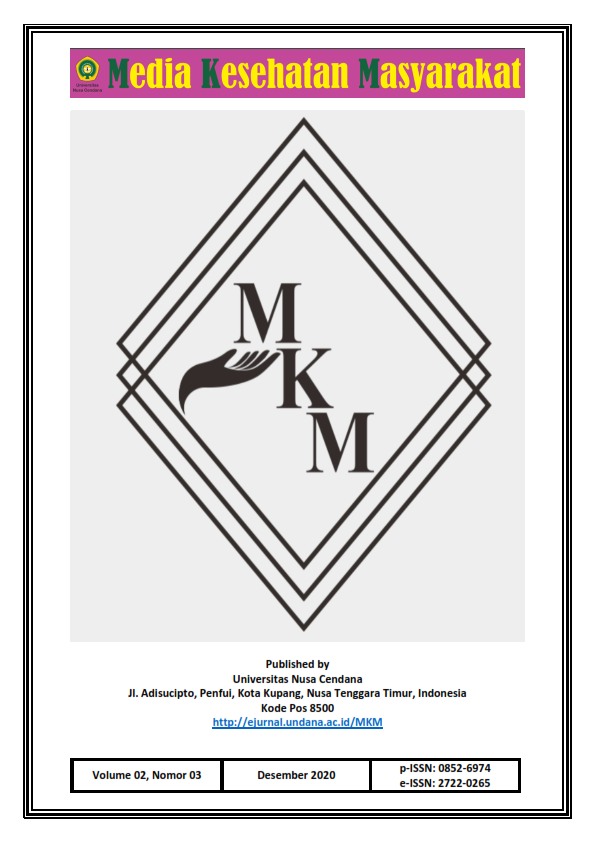Gambaran Pelaksanaan Program Sanitasi Total Berbasis Masyarakat di Desa Oelpuah Kecamatan Kupang Tengah
Abstract
Community-Based Total Sanitation (STBM) is an approach and paradigm for sanitation development in Indonesia that emphasizes the principle of non-subsidies through community empowerment in order to build hygienic and sanitary behavior. Indonesia generally has low coverage of basic sanitation facilities. One of the areas in East Nusa Tenggara Province that has become a priority for STBM Program implementation is Oelpuah Village, Central Kupang District, located in Kupang Regency. The problem in Oelpuah Village is the lack of knowledge in the community related to hygiene and sanitation. The purpose of this research was to get an overview of the implementation of the five pillars of STBM in Oelpuah Village, Central Kupang District in 2020. This research was descriptive. The research was carried out in five hamlets in Oelpuah Village. The sample was selected by random method. The population in this study were all 354 family heads in Oelpuah Village and the sample in this study were 188 heads of households. The results showed that Pillar I, IV, and V were categorized as not implemented Pillar II and IIIwere included in the criteria for implementation.
Downloads
References
Waangsir FWF, Dukabain OM. Kajian Sanitasi Total Berbasis Masyarakat Di Kecamatan Fatuleu Tengah Kabupaten Kupang. J Info Kesehat [Internet]. 2017 Dec 23;15(2):508–23. Available from: http://jurnal.poltekeskupang.ac.id/index.php/infokes/article/view/454
Prayitono J, Widati S. Kajian Strategi Promosi Kesehatan Sanitasi Total Berbasis Masyarakat (STBM) di Kelurahan Kejawan Putih Tambak Kota Surabaya. J Kesehat Lingkung [Internet]. 2018;10(3):267–75. Available from: http://repository.unair.ac.id/id/eprint/82542
Badan Penelitian dan Pengembangan Kesehatan. Hasil Riskesdas 2013 [Internet]. Kementerian Kesehatan Republik Indonesia. Jakarta; 2013. Available from: https://www.kemkes.go.id/resources/download/general/Hasil Riskesdas 2013.pdf
Badan Pusat Statistik Kabupaten Kupang. Kabupaten Kupang Dalam Angka 2019. BPS Kabupaten Kupang, editor. BPS Kabupaten Kupang. Kabupaten Kupang: BPS Kabupaten Kupang; 2019.
Puskesmas Tarus. Data Pelaksanaan STBM Tahun 2019. Kabupaten Kupang; 2019.
Kementerian Kesehatan Republik Indonesia. Peraturan Menteri Kesehatan No. 3 Tahun 2014 [Internet]. Kementerian Kesehatan Republik Indoenesia, 3 Indonesia; 2014. Available from: https://peraturan.bkpm.go.id/jdih/userfiles/batang/Permenkes_3_2014.pdf
Gazali M, Marwanto A, Rahmawati U. Pelaksanaan Sanitasi Total Berbasis Masyarakat (STBM) terhadap Kejadian Infeksi Kecacingan pada Pekerja Penyadap Karet. J Nurs Public Heal [Internet]. 2018 Nov 5;6(2):67–79. Available from: https://jurnal.unived.ac.id/index.php/jnph/article/view/639
Da Silva NDC, Kumaladewi BR, Kurniawan Y, Rahmawansa D. Faktor-Faktor Sanitasi yang Berpengaruh terhadap Timbulnya Penyakit Diare di Desa Klopo Sepuluh Kecamatan Sukodono Kabupaten Sidoarjo [Internet]. Surabaya; 2008. Available from: https://saidnazulfiqar.files.wordpress.com/2011/10/faktor-faktor-sanitasi-yang-berpengaruh-terhadap-timbulnya-penyakit-diare.pdf
Raharjo S, Zulfan M, Ihsan T, Ruslinda Y. Perencanaan Sistem Reduce, Reuse dan Recycle Pengelolaan Sampah di Kampus Universitas Andalas Limau Manis Padang. J Tek Lingkung UNAND [Internet]. 2014;11(2):79–87. Available from: http://jurnaldampak.ft.unand.ac.id/index.php/Dampak/article/view/36/21
Faizah. Pengelolaan Sampah Rumah Tangga Berbasis Masyarakat (Studi Kasus di Kota Yogyakarta) [Internet]. Universitas Diponegoro; 2010. Available from: http://eprints.undip.ac.id/17313/
Maliga I, Darmin. Analisis Penilaian Risiko Kesehatan Lingkungan dengan Menggunakan Pendekatan Environmental Health Risk Assessment (EHRA) di Kecamatan Moyo Utara. Media Ilm Tek Lingkung [Internet]. 2020;5(1):16–26. Available from: http://journal.umpalangkaraya.ac.id/index.php/mitl/article/view/1235
Copyright (c) 2020 Author

This work is licensed under a Creative Commons Attribution-ShareAlike 4.0 International License.

 Megy Justin Ballbessy(1*)
Megy Justin Ballbessy(1*)














